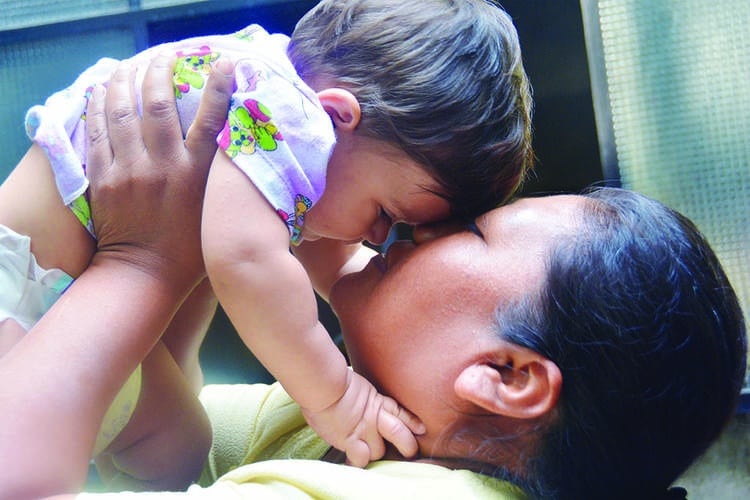Samantha VanHout, Mt. Hope Family Center, Rochester, New York
Sarah C. Fitzgibbons and Alana Russotti, The Society for the Protection and Care of Children, Rochester, New York
Abstract
This article describes an infant and early childhood mental health-informed therapeutic visitation program that offers clinical support, systems-level advocacy, and developmentally appropriate guidance to families navigating the child welfare and family court systems. The program offers treatment, permanency, and placement planning for infants, young children, and their families experiencing trauma, attachment disruption, foster care, and permanency-ambiguity. Through exploration of a programmatic theoretical framework, the authors discuss the process of identifying community gaps, garnering system support, and program design, and they also offer a summary of results from a recent program evaluation including implications for future direction.
Given the rates of child abuse, divorce, and high-conflict custody disputes in families with infants and young children, supervised visitation services (SVS) and therapeutic visitation services (TVS) are in high demand (Children’s Bureau, 2016; Cicchetti, 2004; Symons, 2010). Derived from SVS, TVS is an emerging service designed for families experiencing high-conflict custody as well as for children in out-of-home placements due to child welfare involvement (Supervised Visitation Network [SVN] Standards Task Force, 2006). TVS was developed for families in which the child(ren) and parent(s) have been separated or otherwise unable to form a healthy attachment, display less-than-optimal ways of interacting, have experienced trauma or other experiences that are barriers to engaging in a healthy parent–child relationship, or are approaching a modification in custody arrangements that could benefit from therapeutic support to make the transition successful. Because of the critical importance of healthy caregiving relationships, rapid development, and impact of stress in the first years of life, children from birth to 6 years old have a unique need for infant and early childhood mental health (IECMH)-informed TVS.
Supervised and Therapeutic Visitation Services
SVS allow for a safe place for visitation between children and non-custodial parents with a neutral professional to monitor their visits. Visitation services are essential given that a lack of regular parental contact has a detrimental impact on parent– child attachment, which, in turn, reduces the likelihood that the child will return to their parents’ care (Downs et al., 1996).
There is extensive research supporting the importance of establishing and maintaining a healthy relationship with both parents for child well-being outcomes, which visitation services allow for in these difficult situations (Cicchetti, 2004; Eldar-Avidan et al., 2009; McWey & Mullis, 2004).
TVS are a rather new practice that brings SVS together with child and family therapy with the aim of supporting children and their caregivers in establishing a healthy and secure attachment relationship (SVN Standards Task Force, 2006; Thoennes & Pearson, 1999; Wright, 2000). Although TVS vary in their treatment approach and goals, these programs typically aim to improve the parent–child relationship, increase emotional availability, and resolve trauma symptoms, while also supporting optimal permanency for the child(ren) through custody stabilization (Osofsky & Lieberman, 2011; SVN Standards Task Force, 2006; Thoennes & Pearson, 1999; Wright, 2000). Because of the traumatic nature of many of these separations, family histories of trauma, inherent loss, and relationship distress, visits can be a highly emotional experience for parents and children and therefore a mental health professional’s provision of support, acceptance, guidance, role-modeling, and psychoeducation is vital. Research indicates that dyadic therapy (e.g., child–parent psychotherapy [CPP] and infant–parent psychotherapy) for families at risk of maltreatment increases nurturing and safety (Bavolek, 2002; Lieberman & Zeanah, 1999), and frequent, quality parent–child visitation has been a key factor in the restoration and reunification process (Loar, 1998; McWey & Mullis, 2004).
IECMH-Informed Therapeutic Visitation
Given the community’s sizable gap in critical services and agency expertise in visitation, IECMH, and child welfare, the Society for the Protection and Care of Children (SPCC) set out to design and pilot a TVS program for all aged children, including a specific focus on children birth to 6 years old and their families. The child–parent relationship was identified as the target of service, using the best interest of the child’s current and future development and well-being as our compass to mitigate possible competing clinical focuses.
For infants and young children, foster care placement and custody disputes are ripe for children’s unmet social, emotional, and attachment needs. To the untrained eye, children who are preverbal appear to be asymptomatic, or are considered too young to be impacted by events. Support and intervention are often prioritized for older children with externalizing symptoms or offered in response to parent strengths and needs. At the time of our program’s conception, general awareness of the importance of IECMH promotion, prevention, and intervention was just beginning to emerge in our community. Combined with the paucity of available IECMH clinical services for families, this lack of understanding perpetuated the challenge of holding a firm focus on the social, emotional, and attachment needs of birth to 6-year-olds. Co-existing factors include the legal rights and needs of parents, availability of services, as well as federal and state laws or statutes that often conflict with the needs of children. Lastly, professionals may avoid attending to and intervening with the pain infants and young children are in, as it can be simply too excruciating to imagine; perhaps doing so pokes at one’s own unresolved wounds from infancy and early childhood, or evokes a flooding of untenable empathy due to the vulnerability of infants and young children. From the onset of planning our TVS, we were unwaveringly committed to attending to child development, attachment, trauma, and supporting healing and healthy relationships between caregivers and children, while advocating for collaborative partners to do the same in their practices and decision making.
We began with the roadmap of five core values and beliefs offered by Stinson et al. (2000) that underscores IECMH work (see Box 1) as a touchstone, then turned our attention to the small pool of literature on best practices and predicted impacts of IECMH-informed TVS. In addition, we learned about formalized IECMH-aligned programs, such as Safe Babies Court Teams, which works collaboratively across systems, and has been shown to improve safety, decrease time to permanency, increase placement stability, preserve family relationships, improve access to services, and decrease costs (Casey Family Programs, 2019). We noted the importance of quality IECMH-informed direct service with concurrent multidisciplinary collaboration.
We made the decision to pilot TVS within the well-established visitation services program. By developing under its wings, we had the advantage of
- well-tested policies and procedures for families(e.g., staggered arrival times, visitation center guidelines and rules),
- a building designed specifically with visitation in mind (e.g., separate entrances, private visiting rooms, one-way mirrors, play spaces, security measures),
- relationally based, trauma-informed, developmentally led,and family-focused agency values (e.g., staff participation in reflective supervision [RS], ongoing training in child development and trauma, attachment and family systems theory driven, trauma-informed security and reception staff), and
- decades of professional community relationships, particularly in family court and child welfare.
Of critical importance, we also had the advantage of blended funding in our SVS that allowed for clinical services to be incorporated.
Box 1. Five Basic Beliefs in Infant Mental Health (IMH) Work
1. Optimal growth and development occur within nurturing relationships.2. The birth and care of a baby offer a family the possibility of new relationships, growth and change.
3. What happens in the early years affects the course of development across the lifespan.
4. Early developing attachment relationships may be distorted or disturbed by parental histories of trauma.
5. The therapeutic presence of an I[EC]MH [professional] may reduce the risk of relationship failure and offer the hopefulness of warm and nurturing parental responses (Stinson, Tableman, & Weatherston, 2000, as cited in Weatherston, 2000, p. 5).
While anecdotally we were aware of a need in our community for TVS, we needed to learn more. At the time (2013), families in our community ordered to participate in SVS due to high conflict custody battles often remained on a waitlist, unable to have safe contact, for up to 12 months because of the high demand and low capacity. Nine months of planning included formally confirming funder support, 10 stakeholder interviews with therapeutic visitation professionals across the US, participation in TVS training, and convening a multidisciplinary community stakeholder group (e.g., family court judges/ magistrates, attorneys, court appointed special advocates) for the purpose of relationship building, counsel on program development, and continuous improvement. This process confirmed that our community was highly supportive of a TVS pilot, and our expertise in providing SVS and clinical services for children and families impacted by trauma, loss, and separation suggested that it was an optimal incubator for TVS development. With fewer comparative barriers to efficient melioration, it was decided to pilot TVS with families impacted by high-conflict custody in the family court system.
In the initial stages of program development, we aimed to discover the plausibility of launching a TVS without additional funding. With this in mind, we collaborated with local universities to create a formalized clinical internship training program. Two of the authors took cases in the 1st year and began training master’s and doctoral interns in clinical practices related to therapeutic visitation. We were committed to training our interns in IECMH practices and encouraged referrals by advocating that infants and young children and their parents would find great relational and developmental benefit. In addition, working through an IECMH lens proved valuable in our work with older children and parents who had conflict, trauma, loss, and adversity in their early childhood relationships. Year one focused on providing TVS to 10 families.
Year two focused on adapting practices. We formalized our court report writing, found clarity in defining the child-focused goals of the program, increased clinical support for custodial parents when necessary, and developed a comprehensive assessment that included early childhood relationship history taking for children and for visiting and custodial parents. We found that families who engaged in our services fell generally into one of two groups: short-term clinical services to support relational connection after a significant separation, and long-term therapeutic involvement in order to provide regulation, containment, sensitivity, and perspective for both custodial and visiting parents. This second group of family constellations took many months to find a semblance of relational stability, and the experience of predicted stressors (e.g., developmental tasks, relationship conflict, life stress, court hearings) highlighted the fragileness of the family relationships, marked with great ruptures and discord requiring long-term clinical attention. When TVS ended, children and parents reported and demonstrated higher emotional availability. Both custodial and visiting parents demonstrated increased ability to center their parenting practices on the well-being of the child. Family court reported that families were demonstrating less need for legal involvement, freeing up court time. These families were using clinical professionals to address relational conflict instead of seeking court intervention; the court system appeared to increasingly value TVS. For these reasons, we were able to fund a full-time clinical position, and formalize the therapeutic visitation program.
We had 2 years of program development and implementation underway when the local Department of Human Services (DHS) sought to contract out the majority of their visitation services to a private agency. At the time, our supervised visitation program had a contract to provide a fraction of visitation to children impacted by child welfare related out-of home placements, while DHS staff provided the majority of this work. Of note, DHS and SPCC had designed a visitation center together 5 years earlier, co-located with a pediatric foster care clinic. Our proposal of expanded child welfare SVS included, for the first time, formalized TVS. This new funding supported additional clinicians and flexibility critical to IEMCH work: TVS clinical offerings centered on the infant/young child in a relational context that included biological, foster, and adoptive parents; relative caregivers; transitions from one caregiver to another; and parent–child relationship assessments. The years of practicing collaboration and joint visitation work in a shared space along with our success in TVS in family court allowed us to develop system-wide improvements in services for children in the child welfare system.
Program Design
As the program design unfolded and clinical services began, we realized that the therapeutic work in the room with families was only a piece of supporting a child’s healing and well-being holistically. Thus, our 3-tiered approach was born: (1) direct service, (2) IECMH-focused advocacy, and (3) systems relationship development. These program components are undergirded with IECMH training and RS.
Direct Service
Treatment in TVS begins with what feels most authentic and true: curiosity as we partner with families to consider the experiences and needs of the child. Clinicians spend 6–8 weeks with families as they tell their story—with words, relational actions, and play. Through clinical interview with the visiting parent (e.g., Working Model of the Child Interview; Benoit et al., 1997), interview of the child’s current caregivers, Emotional Availability (EA) ScalesTM (a measure of the quality of adult–child interactions), clinical observation, and talking to other professionals that work with the family, clinicians allow the assessment to take shape over time.

To the untrained eye, children who are preverbal appear to be asymptomatic, or are considered too young to be impacted by events. Photo: Mr.Exen/shutterstock
Clinicians are careful not to allow the adult’s perspective, often riddled with ghosts from their nursery, defenses, conflict, shame, and pain, to overshadow the child’s historical and current experience of being in relationship with their visiting parent. They listen for ways past and present relational distress might be a barrier to the parent–child relationship at hand and look for possible avenues to increase connection and joy. Often there are multiple children in one family in need of supervised visits with their parent(s); and while referrals often initially suggest focus be on the child with the greatest externalized symptomology, the clinician maintains a curious stance as they identify the family member who could most benefit from TVS specifically. As the assessment findings take shape, clinicians reflect back to parents what they think they have learned and suggest a place, or rather a relationship, to start. Practice and literature review informs a set of overarching treatment goals that drive TVS interventions: attachment repair and improved relationship quality, safety, support in processing significant change and transitions, resolving trauma symptoms, family healing, and supporting optimal permanency (Lee & Stacks, 2004; Osofsky & Lieberman, 2011; SVN, 2006; Wright, 2000).
Because parent–child visitation is the platform, the value of meeting dyadically is inherent in TVS. The interventions used are flexible, but largely psychodynamically rooted, and clinicians receive training in IECMH, CPP, play therapy, early childhood development, and attachment-based interventions. Specific training is offered in developmentally led transition planning and bridging caregivers in multiple homes. The length of service is flexible but averages approximately 1 year, determined by clinical goals and custody/permanency decision making. In collaboration with our SVS colleagues, we developed and use the Parent-Child Observation Tool (SPCC, 2019) monthly to organize and track dyadic relationship dynamics in visits.
TVS with families in child welfare include specific inherent difficulty. With future permanency undecided, healing and health in multiple parent–child relationships must be supported. Concurrent planning requires balance and provokes distress. The clinician’s relationship with the parent is seen as a tool to model the rupture and repair in healthy parent–child relationships. The phrase “sensitively transparent” has been coined to support clinicians in holding up the proverbial mirror to clients to allow them a view of their past, present, and their relationship with their child. By compassionately speaking truth to parents, clinicians demonstrate the hope for healing and growth in their relationships. At times the work feels largely like untangling; supporting the parent in separating their thread from their child’s thread, allowing the child to be seen as their own person.
IECMH-Focused Advocacy
Originally conceptualized as a by-product of the clinical work, after a few years of experience, the program reimagined advocacy as part of the work—our second tier. While in the clinical work balance must be maintained by keeping the relationship firmly in mind, in advocacy the focus must be child-centered. Child-centered advocacy includes consideration of all aspects of context. This includes temperament, trauma and loss history, race (with particular attention to the impact of systemic and institutionalized racism across generations within the child welfare and court systems), culture, development, attachment, community, need for permanency/stability, and current and future well-being.

Treatment in therapeutic visitation services begins with what feels most authentic and true: curiosity as we partner with families to consider the experiences and needs of the child. Photo: shinphoto/shutterstock
For each case, advocacy ranges from a quiet, yet steady hum (e.g., regular updates to caseworkers, attorneys, parents) to loud and clear (e.g., court reports, testimony). There is a need for regular relationship tending with attorneys, caseworkers, and other providers to support synchronous work and shared perspectives. Regular IECMH advocacy increases opportunities for harmonious professional collaboration when moments of large decision making, crisis, and surprises present themselves—a sudden change in placement, a new filing in court, a relapse, the birth of a new sibling. Professionals who make decisions have already been discussing the family’s therapeutic history, perspective, strengths, and vulnerabilities through an IECMH lens.
Effective IECMH clinical advocacy with child welfare and legal professionals requires frequent translation, awareness of one another’s roles, and reflection: being curious about the perspectives and intentions of the other while being curious about our own. Clinicians in our program attempt to translate IECMH theory and practice into words that make sense to systems focused largely on physical safety and reducing parental discord. For example, a clinician with strong concerns about the lack of parental sensitivity on the child’s social–emotional well-being likely needs to translate their concerns with child welfare focus and language in mind. In this example, directly connecting clinical concern to predicted risk of placement, permanency, or custody stability may be most effective. TVS clinicians are cautious in offering direct and specific recommendations related to permanency, but offer guidance focused on necessary caregiver qualities, interventions, and supporting healthy relationships with the child trauma history, parent–child relationship history, and development needs in mind. Clinicians report on parents’ growth and struggles related to their role as a caregiver, and symptoms, functioning, and needs of the child. Child welfare and family court systems then consider this information as they make holistically safe decisions for children. IECMH advocacy for one child will inherently impact others in the system. This responsibility and power are not taken lightly, and because of this clinicians take their time in court reports to weave in IECMH-driven psychoeducation, knowing that it may impact future case decision making with infants and young children.
Systems Relationships
As an IECMH-informed program, parallel process can’t be ignored—the way that core relational themes within the family system show up in relationships between supervisor and supervisee, and between clinician and the systems involved. Winnicott (1964) seminally said, “There is no such thing as a baby—meaning that if you set out to describe a baby, you will find you are describing a baby and someone…” (p.88); in other words, a baby cannot be understood outside of the context of relationships with its caregivers. This statement rings true in systems-work as well—there’s no such thing as just a parent–child relationship—there’s a parent–child relationship within the context of the systems supporting them. As we identified the third tier of our program, we again realized that nurturing relationships within the system was not optional, it was necessary.
Building relationships with people within the system needs to be compassionate, trauma-informed, proactive, long-term, and authentic. A professional’s relational behavior is meaningful, just as a client’s is. When presented with a harsh response or ambivalent request from a professional, the IECMH approach requires clinicians to lead with wondering (internally or externally) how this particular family might be impacting the helper. When a relational rupture occurs between professionals, attending to the repair can strengthen the future work with the family.
Working within systems where the adults make decisions about children requires an unwavering commitment to the perspective of the child. Therefore, it is the clinician’s responsibility to assert the perspective of the child as they build and maintain relationships with child welfare and family court professionals. We knew we were on the right path when, during a large provider’s meeting, a pediatric health provider said, “I have [the TVS clinician’s] voice in my head and must ask, what does this mean for the baby?”
The child welfare and family court systems are large, and professionals are ripe for compassion fatigue and burnout (Sprang et al., 2011). Traumatized systems lead to challenged organizational supports for professionals on the frontlines as well as those in leadership positions, burdened by the need for global decisions being passed down from a stressed and stretched system. Clinicians’ trauma-informed way of being with the families served by TVS have to be sensitively applied to our child welfare and family court partners as this way of being has direct implications on the well-being of our community’s children.
IECMH and RS Program Foundation
If the three tiers of our program are pieces of fabric, then RS and IECMH training are the threads we use to stitch them together. While the program serves families with children of all ages, approximately 50% of the families served include children from birth to 6 years old. At the onset of their employment, clinicians participate in multiple IECMH-related trainings, beginning with a 10-week multidisciplinary IECMH training, with a focus on theory and clinical practice, aligned with the Alliance for the Advancement of Infant Mental Health’s IMH Endorsement® (Michigan Association for Infant Mental Health, 2017). Initial studies have shown that participating in IECMH-related training increases practitioner knowledge and self-efficacy (Hughes et al., 2020). This initial IECMH training is followed by participation in CPP and EA Scales training. Unexpectedly, the focus on local stakeholder engagement, IECMH advocacy, and system relationship development resulted in DHS and family court personnel increasingly seeking out IECMH training and RS for themselves.
Each clinician in TVS receives weekly individual and group RS from a reflective supervisor who is Endorsed® through the state’s IMH association as an IMH Specialist, or an IMH Mentor-Clinical. Reflective supervision/consultation (RS/C) has the dual purpose of supporting best practices for infants, young children, and their families, while fostering professional development, and holding the practitioner in mind, just as practitioners hold the family and infants in mind. RS/C supports clinicians in attending to race, implicit bias, perceptions, and behavior; cultural responsivity/humility are aligned as processes in supporting practitioners’ commitment to self–reflection, self-awareness, and openness to learning about themselves from others (Hook et al., 2016). RS/C is considered a trauma-informed practice (Van Berckelaer, 2011) which improves the quality of IECMH services. RS/C has been found to increase practitioner insightfulness and knowledge as well as improve practice, role satisfaction, identification of social–emotional concerns, service provision, and ability to cope with job-related stress (Frosch et al., 2018; Gilkerson & Kopel, 2005; Virmani & Ontai, 2010), lower rates of staff turnover, and be correlated with increases in attaining permanency for children (National Council on Crime and Delinquency, 2006). In addition, practitioners who receive RS/C describe improvements in their capacity to shift perspective, address personal biases, set boundaries, slow down, observe, and listen, while feeling more effective in their ability to assess, focus on, and respond to young children (Harrison, 2016).
Program Evaluation Results and Implications
Empirically and anecdotally, evidence that the program was benefiting children and families was apparent, but program efficacy needed to be understood from a quantitative lens. In 2019, an external, longitudinal program evaluation assessed the effectiveness of our TVS in establishing permanency/custody stabilization and increasing EA between children and parents. It also examined treatment components within TVS that predicted treatment outcomes and maintenance of treatment effects 6 months post-intervention. The participants of this study were former clients of the TVS described in the IECMH Informed Therapeutic Visitation section. The total sample size was 87 parent–child dyads. Demographics of the families were as follows: approximately 58% Caucasian, 33% African American, 2% Hispanic, and 7% Bi-racial. Although this program serves children from birth to 18 years old, approximately half (48.3%) of the cases were children birth to 6 years old. The majority of caregivers enrolled in TVS were mothers (66%) with the remaining caregivers being fathers (34%). Most of the cases were referred by DHS (63%) and the rest were referred by court (37%). The average length of treatment in TVS was approximately 11.5 months (SD = 9.15). Secondary data of 87 participants who received TVS were analyzed using paired samples t-tests, point biserial correlations, and multiple linear and logistic regression. A summary and discussion of the results from this program evaluation study follows.

Clinicians are careful not to allow the adult’s perspective to overshadow the child’s historical and current experience of being in relationship with their visiting parent. Photo: Photographee.eu/shutterstock
Of those who received TVS, 74% achieved permanency/ custody stabilization. More specifically, 62% of the DHS-referred cases achieved permanency and 94% of the court-referred cases maintained custody stabilization. In regard to permanency status 6 months post-treatment, 63% maintained their permanency status, 24% newly established permanency, 3% had ruptured permanency, and the remaining 10% did not achieve permanency during treatment nor 6 months post. Of those who achieved permanency/custody stabilization, 63% were with a biological parent, 17% were with a relative, and 6% were adopted. In addition, there was a significant decrease from pre-treatment to post-treatment in child safety concerns (i.e., fewer indicated Child Protection Services reports) among those who received TVS. There was also a significant decrease from pre-treatment to post-treatment in the number of placement transitions for children who received TVS.
EA among the dyads was also assessed and a large positive correlation was found between pre- and post-treatment EA. As pre-treatment EA increased, post-treatment EA also increased, indicating it is fairly stable. However, the EA scales were sensitive to treatment effects as this study found that EA significantly increased from pre-treatment to post-treatment among parent–child dyads with at least 3 months of TVS. Furthermore, the percentage of dyads in each of the EA categories pre- and post-intervention respectively are as follows: Problematic Zone 9% to 7% (2% decrease), Detached 55% to 20% (35% decrease), Complicated EA 36% to 59% (23% increase), and Dyadic EA 0% to 15% (15% increase).

Working within systems where the adults make decisions about children requires an unwavering commitment to the perspective of the child. Photo: Ruslana lurchenko/shutterstock
Analyses regarding treatment components that influenced permanency and EA outcomes found that the specific therapeutic modality used and length of clinical experience of the clinician (intern vs. seasoned clinician) did not have a significant impact on either outcome. Of important note, all the clinicians had intensive training in IECMH and received RS, which likely served as the common foundation from which all services were provided. Lastly, analyses regarding predictors of treatment outcomes suggested that having attempted fewer formal support services prior to being referred to TVS uniquely predicted permanency being established post-TVS. This finding concurs with prior research showing negative experiences in previous treatments can carry over to future treatment and negatively impact treatment outcomes (Kessner et al., 2014). Furthermore, research has also indicated that the match between client’s needs and intensity and focus of services, also known as the client–treatment match, is a key factor in the efficacy of treatment (Bickman et al., 1997). Therefore, if families deemed appropriate for the TVS level of service were referred to TVS immediately upon the children entering care and the initiation of high-conflict custody battles, they would likely have better treatment outcomes than those who attempted several other services with minimal success.
The results of this study have several significant implications for TVS and the child welfare system as a whole, including increasing the availability of IECMH-informed TVS to improve outcomes for children in foster care. Given the high demand for quality services, courts and DHS agencies need evidence regarding effective services to address this population’s needs. Results from the current study support the use of TVS for improving permanency outcomes and EA as well as decreasing the number of placement transitions and physical safety concerns for the child. Furthermore, families should be referred for TVS as early on as possible rather than after other services have been unsuccessful. In order to increase the capacity to serve a larger population, the use of interns should be considered as results from the current study in addition to some previous findings suggest that there are no significant differences in treatment outcomes for services provided by interns as compared to seasoned staff (Brown et al., 2005; Forand et al., 2011; Schauble et al., 1989).
The program evaluation provided several other key findings.
- Those who received TVS had
- improved permanency and EA outcomes and
- a decrease in the number of placement transitions and physical safety concerns for the child.
- Having attempted fewer services prior to TVS uniquely predicted permanency being established post-TVS.
- While specific therapeutic modalities used didn’t make a significant difference in permanency or EA outcomes, the most apparent commonality in practice for all clinicians was intensive training in IECMH and receiving ongoing RS.
- There were no significant differences in treatment outcomes for services provided by interns as compared to seasoned clinicians.
Summary and Recommendations
After reflecting on the challenges and successes of developing and implementing TVS, it became clear that there were several key lessons learned on this journey: keeping the infant or young child and the parent–child relationship at the forefront as well as the importance of access to RS, IECMH training for clinicians, and parallel processes, such as nurturing relationships among systems in order to effectively advocate on behalf of children and families. Furthermore, we urge others on this journey to be creative in leveraging existing funding and to start with a pilot program. In addition, we encourage others to listen to, learn from, and partner with cross-disciplinary stakeholders in creating and adapting programing as these diverse perspectives aid in ensuring the development of services that will be invested in and supported by the community.
The program evaluation of TVS helped us further understand our program in order to strengthen and expand. This study revealed numerous promising findings including, but not limited to, improved permanency and EA as well as a decrease in transitions and physical safety concerns for the child(ren). These findings suggest that child welfare and court systems should invest in expanding TVS to better serve families in need of this specialized level of support and will be used to advocate for such. However, further research is needed to demonstrate the effectiveness of TVS as a separate intervention from SVS, as well as key treatment factors that predict positive outcomes. Future research should also explore ideal TVS versus SVS participants on the basis of case factors and individual characteristics, such as length of time in care, EA at outset of treatment, number of indicated child protective services reports, level of social support, mental health status, and trauma history.
Author Bios
Samantha VanHout, PhD, currently works at Mt. Hope Family Center in Rochester, NY, as a child and family therapist and clinical supervisor for interns as well as a home study social worker for Adoption STAR. Dr. VanHout holds a bachelor’s degree in psychology from Ithaca College and a doctorate in counseling and school psychology from the University at Buffalo. Her research and clinical experience thus far have focused primarily on trauma, parent–child attachment, and the child welfare system. Dr. VanHout has worked within residential treatment centers, schools, and community-based programs. Currently, her role at Mt. Hope Family Center entails providing therapeutic services, such as child–parent psychotherapy, trauma-focused cognitive behavioral therapy, and interpersonal psychotherapy as well as providing reflective supervision to interns.
Sarah C. Fitzgibbons, LMHC, MT-BC, IMH-E®, has spent the past 20 years practicing, researching, supervising, teaching, and developing programs in the field of infant and early childhood mental health (IECMH), with a specific expertise in infants and young children impacted by trauma, loss, attachment disruptions, child welfare, and parent–child relationship assessments. Ms. Fitzgibbons currently works as the vice president of programs and practices at the Society for the Protection and Care of Children in Rochester, NY, and is an instructor of IECMH coursework at The Warner School of Education (University of Rochester). She holds a bachelor’s degree in music therapy, a master’s degree in counseling psychology from Naropa University, and completed postmasters training in infant mental health through the University of Colorado (The Kempe Center).
Alana Russotti, LCSW, IMH-E®, currently works at the Society for the Protection and Care of Children (SPCC) in Rochester, NY, as the director of reflective practices, as a trainer and consultant in SPCC’s Mary Ellen Institute, and as an owner and psychotherapist of Kaleidoscope Wellness, LLC. Ms. Russotti holds a bachelor’s degree from St. John Fisher College in psychology and women and gender studies, and a master’s degree from Fordham University in social work with a clinical concentration. Fueled by a core belief that the most meaningful way to support children is through their relationships with their caregivers, she has been supporting and developing more intensive supervised visitation service for more than 10 years. In 2014, Alana co-created Rochester’s first therapeutic visitation program and worked as the clinical supervisor of this program for several years. Through her work in SPCC’s Mary Ellen Institute, Alana co-teaches an infant mental health course and in 2017 co-developed her region’s first reflective supervision learning collaborative.
Suggested Citation
VanHout, S., Fitzgibbons, S. C., & Russotti, A. (2020). Infant and early childhood mental health-informed therapeutic visitation: An overview and evaluation. ZERO TO THREE Journal, 41(1), 22–30.
References
Bavolek, S. (2002). Nurturing Parents Program and over 35 years of evidence. www.nurturingparenting.com
Benoit, D., Zeanah, C. H., Parker, K. C. H., Nicholson, E., & Coolbear, J. (1997). “Working Model of the Child Interview”: Infant clinical status related to maternal perceptions. Infant Mental Health Journal, 18(1), 107–121. https://onlinelibrary.wiley.com
Bickman, L., Karver, M. S., & Schut, L. J. A. (1997). Clinician reliability and accuracy in judging appropriate level of care. Journal of Consulting and Clinical Psychology, 65(3), 515–520. https://doi.org/10.1037/0022-006X.65.3.515
Brown, G. S., Lambert, M. J., Jones, E. R., & Minami, T. (2005). Identifying highly effective therapists in a managed care environment. The American Journal of Managed Care, 11, 513–520. www.researchgate.net/publication/7665841
Casey Family Programs. (2019, November). How does the Safe Babies Court TeamTM approach improve outcomes for infants and toddlers? https://caseyfamilypro-wpengine.netdna-ssl.com
Children’s Bureau. (2016). Child maltreatment 2014. U.S. Department of Health & Human Services, Administration for Children and Families, Administration on Children, Youth and Families. Retrieved from www.acf.hhs.gov
Cicchetti, D. (2004). An odyssey of discovery: Lessons learned through three decades of research on child maltreatment. American Psychologists, 59(8),731–741. https://doi.org/10.1037/0003-066X.59.8.731
Downs, S., Costin, L., & McFadden, E. (1996). Security of attachment and parent: Homeless and low income housed mothers and infants. American Journal of Orthopsychiatry, 69, 337–346. https://doi.org/10.1037/h0080408
Eldar-Avidan, D., Haj-Yahia, M. M., & Greenbaum, C. W. (2009). Divorce is a part of my life, resilience, survival, and vulnerability: Young adults’ perception of the implications of parental divorce. Journal of Marital and Family Therapy, 35(1), 30-46. https://doi.org/10.1111/j.1752-0606.2008.00094.x
Forand, N. R., Evans, S., Haglin, D., & Fishman, B. (2011). Cognitive behavioral therapy in practice: Treatment delivered by trainees at an outpatient clinic is clinically effective. Behavior Therapy, 42(4), 612–623. https://doi.org/10.1016/j.beth.2011.02.001
Frosch, C. A., Varwani, Z., Mitchell, J., Caraccioli, C., & Willoughby, M. (2018). Impact of reflective supervision on early childhood interventionists’ perceptions of self-efficacy, job satisfaction, and job stress. Infant Mental Health Journal, 39(4), 385–395. https://doi.org/10.1002/imhj.21718
Gilkerson, L., & Kopel, C. (2005). Relationship-based systems change: Illinois’ model for promoting social-emotional development in Part C early intervention. Infants & Young Children, 18, 349–365. https://doi.org/10.1097/00001163-200510000-00010
Harrison, M. (2016). Release, reframe, refocus, and respond: A practitioner transformation process in a reflective consultation program. Infant Mental Health Journal, 37(6), 670–683. https://doi.org/10.1002/imhj.21606
Hook, J. N., Boan, D., Davis, D. E., Aten, J. D., Ruiz, J. M., & Maryon, T.(2016). Cultural humility and hospital safety culture. Journal of Clinical Psychology in Medical Settings, 23(4), 402–409. https://doi.org/10.1007/s10880-016-9471-x
Hughes, T., McGlade, A., & Killick, C. (2020). Does training enhance professional practice in infant mental health? Practice, 32(3), 229–244. https://doi.org/10.1080/09503153.2019.1626363
Kessner, S., Forkmann, K., Ritter, C., Wiech, K., Ploner, M., & Bingel, U. (2014). The effect of treatment history on therapeutic outcome: Psychological and neurobiological underpinnings. PLOS One, 9(9), e109014. https://doi.org/10.1371/journal.pone.0109014
Lee, R. E., & Stacks, A. M. (2004). In whose arms? Using relational therapy in supervised family visitation with very young children in foster care. Journal of Family Psychotherapy, 15(4), 1–14. https://doi.org/10.1300/J085v15n04_01
Lieberman, A. F., & Zeanah, C. H. (1999). Contributions of attachment theory to infant–parent psychotherapy and other interventions with infants and young children. In J. Cassidy & P. R. Shaver (Eds.), Handbook of attachment: Theory, research, and clinical applications (p. 555–574). The Guilford Press.
Loar, L. (1998). Making visits work. Child Welfare, 77(1). 41–58.
McWey, L. M., & Mullis, A. (2004). Improving the lives of children in foster care: The impact of supervised visitation. Family Relations, 53(3), 293–300. https://onlinelibrary.wiley.com/doi/10.1111/j.0022-2445.2004.0005.x
Michigan Association for Infant Mental Health. (2017). Competency guidelines endorsement for culturally sensitive, relationship-focused practice promoting infant mental health. www.michigan.gov
Osofsky, J. D., & Lieberman, A. F. (2011). A call for integrating a mental health perspective into systems of care for abused and neglected infants and young children. American Psychologist, 66(2), 120–128. https://doi.org/10.1037/a0021630
Schauble, P. G., Murphy, M. C., Cover-Paterson, C. E., & Archer, J. (1989). Cost effectiveness of internship training programs: Clinical service delivery through training. Professional Psychology: Research and Practice, 20(1), 17–22. https://doi.org/10.1037/0735-7028.20.1.17
Society for the Protection and Care of Children (SPCC). (2019). Parent-Child Observation Tool (P-COT). Unpublished instrument.
Sprang, G., Craig, C., & Clark, J. (2011). Secondary traumatic stress and burnout in child welfare workers: A comparative analysis of occupational distress across professional groups. Child Welfare, 90(6), 149–168. www. researchgate.net/publication/224845524
Stinson, S., Tableman, B., & Weatherston, D. (2000). Guidelines for infant mental health practice. Michigan Association for Infant Mental Health.
Supervised Visitation Network Standards Task Force and the Standards and Guidelines Committee. (2006, July). Standards for supervised visitation practice. www.afccnet.org
Symons, D. K. (2010). A review of the practice and science of child custody and access assessment in the United States and Canada. Professional Psychology: Research and Practice, 41(3), 267–273. https://doi.org/10.1111/j.174-1617.1999.tb00546.x
Thoennes, N., & Pearson, J. (1999). Supervised visitation: A profile of providers. Family & Conciliation Courts Review, 37(4), 460–477. https://doi.org/10.1111/j.174-1617.1999.tb00546.x
Van Berckelaer, A. (2011). Using reflective supervision to support traumainformed systems for children: A white paper developed for the Multiplying Connections Initiatives. www.multiplyingconnections.org
Virmani, E. A., & Ontai, L. L. (2010). Supervision and training in child care: Does reflective supervision foster caregiver insightfulness? Infant Mental Health Journal, 31(1), 16–32. https://doi.org/10.1002/imhj.20240
Weatherston, D. (2000). The infant mental health specialist. ZERO TO THREE Journal, 21(2), 3–10.
Winnicott, D. W. (1964). The child, the family, and the outside world. Penguin.
Wright, L. (2000). Toolbox No. 1. Using visitation to support permanency. CWLA Press.





